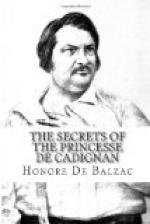“She was a little fool,” said Madame d’Espard, gravely. “Mademoiselle des Touches was delighted to get rid of Conti. Beatrix never perceived how that surrender, made by a superior woman who never for a moment defended her claims, proved Conti’s nothingness.”
“Then you think she will be unhappy?”
“She is so now,” replied Madame d’Espard. “Why did she leave her husband? What an acknowledgment of weakness!”
“Then you think that Madame de Rochefide was not influenced by the desire to enjoy a true love in peace?” asked the princess.
“No; she was simply imitating Madame de Beausant and Madame de Langeais, who, be it said, between you and me, would have been, in a less vulgar period than ours, the La Villiere, the Diane de Poitiers, the Gabrielle d’Estrees of history.”
“Less the king, my dear. Ah! I wish I could evoke the shades of those women, and ask them—”
“But,” said the marquise, interrupting the princess, “why ask the dead? We know living women who have been happy. I have talked on this very subject a score of times with Madame de Montcornet since she married that little Emile Blondet, who makes her the happiest woman in the world; not an infidelity, not a thought that turns aside from her; they are as happy as they were the first day. These long attachments, like that of Rastignac and Madame de Nucingen, and your cousin, Madame de Camps, for her Octave, have a secret, and that secret you and I don’t know, my dear. The world has paid us the extreme compliment of thinking we are two rakes worthy of the court of the regent; whereas we are, in truth, as innocent as a couple of school-girls.”
“I should like that sort of innocence,” cried the princess, laughing; “but ours is worse, and it is very humiliating. Well, it is a mortification we offer up in expiation of our fruitless search; yes, my dear, fruitless, for it isn’t probable we shall find in our autumn season the fine flower we missed in the spring and summer.”
“That’s not the question,” resumed the marquise, after a meditative pause. “We are both still beautiful enough to inspire love, but we could never convince any one of our innocence and virtue.”
“If it were a lie, how easy to dress it up with commentaries, and serve it as some delicious fruit to be eagerly swallowed! But how is it possible to get a truth believed? Ah! the greatest of men have been mistaken there!” added the princess, with one of those meaning smiles which the pencil of Leonardo da Vinci alone has rendered.
“Fools love well, sometimes,” returned the marquise.
“But in this case,” said the princess, “fools wouldn’t have enough credulity in their nature.”
“You are right,” said the marquise. “But what we ought to look for is neither a fool nor even a man of talent. To solve our problem we need a man of genius. Genius alone has the faith of childhood, the religion of love, and willingly allows us to band its eyes. Look at Canalis and the Duchesse de Chaulieu! Though we have both encountered men of genius, they were either too far removed from us or too busy, and we too absorbed, too frivolous.”




